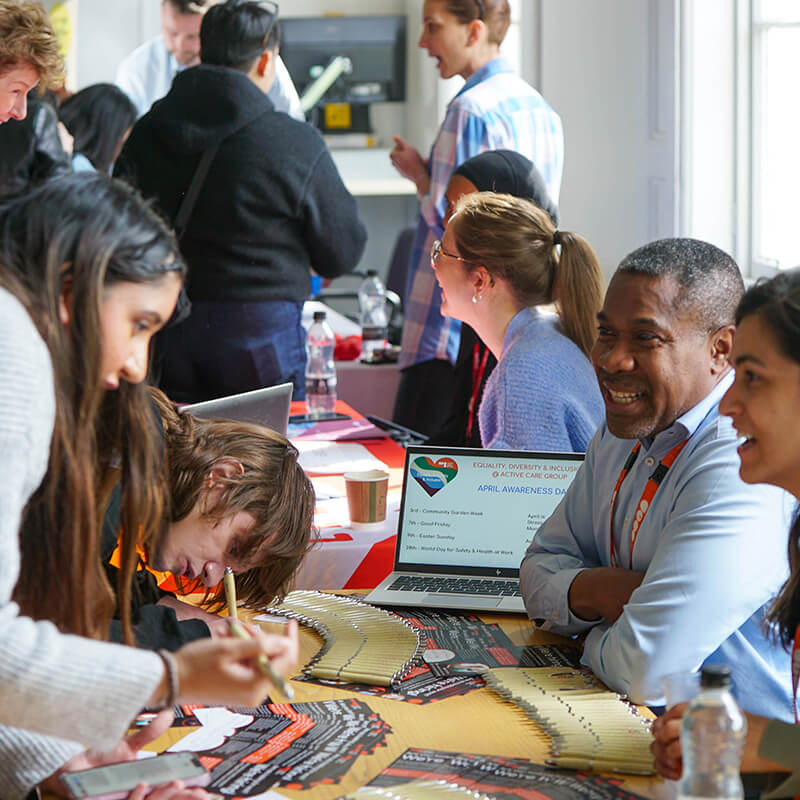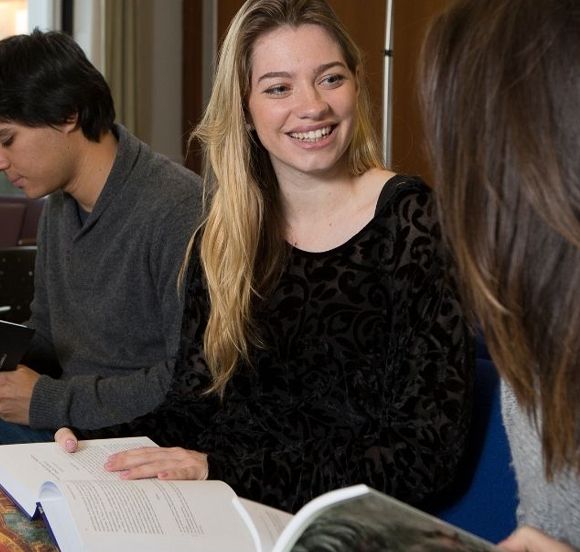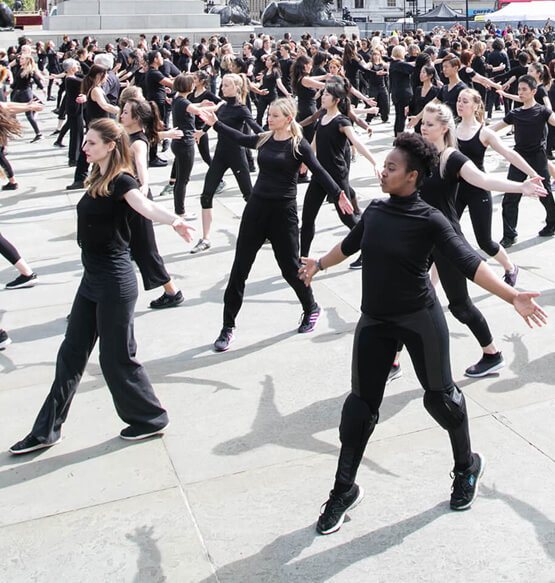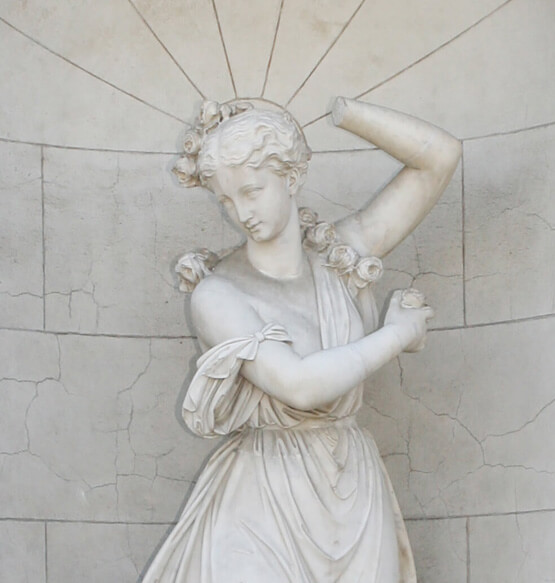You'll need:
112 UCAS points (or equivalent)
Foundation Year entry: 64 UCAS points (or equivalent)
UCAS code:
V501
V510 (if choosing Foundation Year)
Start date(s):
September 2025
September 2026
Clearing
CLEARING 2025
Be Roehampton
Open for Clearing
Call us on 0300 303 8320Complete our Clearing self-application
An experience like no other. On your course, you will learn how to apply your interpretative and analytical skills to a whole range of contemporary issues regarding community, public policy, social and environmental justice, and your personal life.
Did you know?
Discussion and debate lie at the heart of this course, and you will be taught by research-active staff, many of whom are leaders in their field.
Top modern university in London in Theology & Religious Studies
(Complete University Guide 2025)

Top modern university in London in Philosophy
(Complete University Guide 2025)

Theology and Religious Studies ranked 1st in London in all categories
National Student Survey 2024

Foundation Year
This course can also be studied with a foundation year (September entry only).
Modules
This course offers all students the option of a one-year paid work placement, to boost your employability even further. If you choose this route, you will take the placement following year two of your course, and then return to complete your degree.
Why take a placement?
A placement year is the perfect opportunity to gain valuable work experience, to build on the career skills we will teach you on this degree. The connections you make on the placement will improve your career prospects further, and equip you with the skills you need to secure graduate-level employment.
How we support you
The University's Placement and Work Experience Team are experts at helping you to secure a placement. They will work closely with you from the start, helping you research potential employers, discover placement opportunities, create and pitch your CV, and will coach you to perform well in interviews. We aren't able to guarantee a placement, but our sector-leading advisors will give you the best possible chance of securing one.
Find out more about how we'll support you
We understand that your plans might change once you start your programme. If you decide not to do a placement, you will have the option of completing the three year version of your programme.
Whatever your choice, you will have access to many opportunities for work experience through our Placement and Work Experience Team, and access to face-to-face and 24/7 online careers support.
This course offers a foundation year, which takes place at the beginning of your studies. Studying a foundation year will give you academic and practical experience, and a strong introduction to your subject, ensuring you succeed on your undergraduate degree.
30 credits
You will develop your core academic and integrated English language skills of speaking, listening, reading and writing. You will become familiar with key academic skills and concepts, such as referencing methods and awareness of academic integrity and tone. You will apply these skills and knowledge to both broad topics and also your chosen subject pathway.
Teaching and learning
You will be required to actively engage in on-campus learning for up to 10 hours a week.
You will be taught through a full range of teaching and learning methods, which include lectures, seminars, workshops, discussion groups, group directed tasks and presentations. This will enable you to learn from your peers and tutors in both structured and information settings.
You will be encouraged to think creatively about your approach to learning and discussions with your peers. You will also have access to recordings, resources, links and signposting through Moodle to enrich your learning.
Assessment
You will be assessed through group and individual presentations, comparative and reflective essays, multiple choice exams, coursework and reports, oral exams, portfolios, case studies and blogs.
30 credits
You will develop your core academic and integrated English language skills of speaking, listening, reading and writing. You will become familiar with key academic skills and concepts, such as referencing methods and awareness of academic integrity and tone. You will apply these skills and knowledge to both broad topics and also your chosen subject pathway.
Teaching and Learning
You will be required to actively engage in on-campus learning for up to 10 hours a week.
You will be taught through a full range of teaching and learning methods, which include lectures, seminars, workshops, discussion groups, group directed tasks and presentations. This will enable you to learn from your peers and tutors in both structured and information settings.
You will be encouraged to think creatively about your approach to learning and discussions with your peers. You will also have access to recordings, resources, links and signposting through Moodle to enrich your learning.
Assessment
You will be assessed through group and individual presentations, comparative and reflective essays, multiple choice exams, coursework and reports, oral exams, portfolios, case studies and blogs.
30 credits
You will develop your research, numeracy and information technology skills. You will investigate the difference between primary and secondary research, conduct your own research project and demonstrate your findings through data analysis. You will also develop your awareness of equality, diversion and inclusion in the UK, through a real-world issue; discrimination in the workplace.
Teaching and learning
You will be required to actively engage in on-campus learning for up to 10 hours a week.
You will be taught through a full range of teaching and learning methods, which include lectures, seminars, workshops, discussion groups, group directed tasks and presentations. This will enable you to learn from your peers and tutors in both structured and information settings.
You will be encouraged to think creatively about your approach to learning and discussions with your peers. You will also have access to recordings, resources, links and signposting through Moodle to enrich your learning.
Assessment
You will be assessed through group and individual presentations, comparative and reflective essays, multiple choice exams, coursework and reports, oral exams, portfolios, case studies and blogs.
30 credits
This module supports a broad exploration of crime and law and its integration within society across various sources, which includes diverse cultural, social, and political representations. By analysing a wide range of topics, you are encouraged to critically engage with how disability, gender and race are represented and viewed in relation to crime and law.
This course integrates sustainability by looking at the sustainability of social interactions and your results and consequences in relation to crime and law. Social responsibility, legal injustice across the globe and inequality are all featured. Social Responsibility is embedded through topics such as social identity, prejudice and exclusion. Social Cognitive Theory and Rational Choice Theory helps you understand challenges and question accountability for individuals and communities.
This course fosters global engagement by examining the inequalities experienced in other cultures, particularly in relation to race, gender and exclusion. Global challenges are addressed at every step equipping you with the skills to navigate a globalised world in a variety of ways. By analysing data and text concerning diverse cultures and contexts, you will develop an understanding of how individuals and cultures operate amongst injustices in a globalised world, preparing you to engage thoughtfully with diverse audiences.
Teaching and learning
Through lectures, workshops, group work, and structured academic writing, you will have the opportunity to practice the core academic skills needed for your future studies. Critical thinking will be developed through tasks such as text analysis, group discussions, and the ability to create well-structured academic assignments, including essays and presentations.
The teaching delivery for each module consists of one, one-three-hour lecture and one, two-hour workshop per week. You will get a diverse learning experience through case studies and active learning workshops and microteaches.
You will also have an additional 30 minutes of online support each week, consisting of activities to develop your presentation skills and to provide you with opportunities to explore wider policy implementation in diverse/comparative transnational examples.
Assessment
This module will be assessed using a video presentation and summative essay.
30% - video presentation, working in groups, you will produce a video on a topic taught on the curriculum and explain its impact on UK society, using a real-world example.
70% - summative essay, you will identify an issue, either historical or contemporary, that has had an impact on UK society and connect it to at least one of the key topics covered in the course.
30 credits
This module supports a broad exploration of social understanding across various sources, which includes diverse cultural, social, and political representations. By analysing a wide range of topics, you are encouraged to critically engage with how disability, gender and race are represented and viewed. This ensures that your projects and research can reflect a variation of perspectives, fostering a more inclusive and holistic learning environment.
This course integrates sustainability by looking at the sustainability of social interactions and your results and consequences. Social responsibility, globalisation and inequality are all featured. Social Responsibility is embedded through topics such as social identity, prejudice and exclusion. Social Cognitive Theory and Rational Choice Theory help you understand challenges and question accountability for individuals and communities.
This course fosters global engagement by examining the inequalities experienced in other cultures, particularly in relation to race, gender and class. Global challenges are addressed at every step, equipping you to navigate a globalised world in a variety of ways. By analysing data and text concerning diverse cultures and contexts, you develop an understanding of how individuals and cultures operate in a globalised world, preparing you to engage thoughtfully with diverse audiences.
Teaching and learning
The teaching delivery for each module consists of one, one-three-hour lecture and one, two-hour seminar per week. Lecturers will cover core indicative content, while seminars will consist of research workshops, as well as forming small groups and learning on relevant case studies.
You will also have an additional 30 minutes of online support each week, consisting of activities to develop your presentation skills and to provide you with opportunities to explore wider policy implementation in diverse/comparative transnational examples.
Assessment
This module will be assessed using an academic poster and a summative essay.
40% - academic poster, you will design a poster that provides key information and sociological analysis of your selected story or issue chosen from key weekly topics.
60% - summative essay, you will conduct a sociological analysis of a story or issue you have encountered in the media.
These are the current planned modules on this course and may be subject to change.

Skills
On our BA Philosophy, Religion and Ethics course, you will graduate with a professional skillset.
This incorporates:
- The development of highly transferable and employable skills such as critical thinking, argumentation, textual analysis, and clear communication.
- The ability to analyse multiple forms of media, to write and present material for a public audience, and to read and analyse policy documents.
- The oppurtunity to take up work placements, build a creative portfolio and to engage in collaborative projects.
These three strands will ensure that you are preparing for successful career path.
Learning
Experience a dynamic, contemporary curriculum at our green London campus.
Discussion and debate lie at the heart of this course, and you will be taught by research-active staff, many of whom are leaders in their field, through a variety of methods and formats, including:
- Lectures
- Individual tutorials
- Class discussions
- Seminars
Each year of this course dedicates time to developing your academic, professional, and key transferable skills so that by the time you graduate, you will be ready for your career, having built professional contacts and gained work experience.

Dr Simonetta Calderini
My name is Simonetta, I am Reader in Islamic Studies, and I have been teaching at Roehampton for 20 years. Teaching, guiding and learning from students through the topics they choose are my favourite aspects of this profession. Research is my other passion which enriches my teaching. I've written books on women and Islam during the Fatimid dynasty and, more recently, on Muslim women leading prayer. Together, we will go beyond the daily news headlines on Islam and Muslims and discover the depth, variety and richness of Islam as a religion, a system of thought, in its legal elaborations, ethical values and lived spiritual experiences. We will meet Malcolm X, Ibn al-Arabi, past and present mystics, women imams, human rights activists, as well as Muslim philosophers who succeeded in reconciling Greek philosophy with Islamic revelation.

Rev Dr Martin Poulsom
My name is Martin and I’m a Senior Lecturer in Theology. In my teaching, I explore key ideas in Christian theology and ways in which theological ideas and practice can interact with the contemporary world. We look together at ways in which theology and philosophy have influenced the world we live in and how they could help to shape its future. My research is focussed on the contribution that Christianity can make in response to the climate crisis, which we consider in the first-year module Religion, Ecology and Politics, alongside contributions from Asian Religions. These topics always generate lively debate, as we think about the kind of world we want to live in and how we can make it a better place.

Dr Angie Pepper
I’m Angie, I’m a Lecturer in Philosophy and I convene the module in Animal Rights and Environmental Ethics. I also teach undergraduate courses in ethics and political philosophy. I joined Roehampton in 2020 and I have really enjoyed working closely with my students on the moral, social, and political issues that matter to them. The best things about Philosophy at Roehampton are the friendly teaching team who have varied and exciting research interests, and the time and support that we are able to give each student to help them realise their full potential.

Dr Neil MacDonald
My name is Neil. I am Reader in Theological Studies and have been teaching at Roehampton for nearly 20 years. My interest is in Christianity and its emergence out of Judaism. My research expertise is really the first-century origins of the Christian-Jewish-Monotheistic claim that Jesus is God and not merely a god. This requires not merely historiographical acumen but also theological, hermeneutical, and philosophical discrimination. So I am a theological scholar of a different kind, one who thinks the answer is ultimately to be found in a more sophisticated take on history than New Testament scholars are wont to assume. I have a first-class honours degree in Philosophy and a Masters Degree and PhD in Systematic Theology. I am the programme convenor of this degree and contribute to those PRE modules that require specialist theological and philosophical expertise. I have also taught Ludwig Wittgenstein for the Philosophy degree. I look forward to meeting, teaching and learning from, you in your journey through higher education.

Dr John Moxon
Hello, I'm John Moxon, Principal Lecturer in Biblical studies and was part of the team that designed the original Philosophy, Religion and Ethics course at Roehampton. I currently act as subject lead for the Religion, Theology, Culture and Philosophy subject area. I teach a range of modules on biblical and para-biblical texts as well as on Judaism and early Christianity in the Greco-Roman world, with a special interest in prophecy, dreams and healing. I would be delighted to hear from anyone interested in project work in this area!
Career
Your future is yours to choose.
As a graduate of BA Philosophy, Religion and Ethics, you will have an expert grasp of the complex nature of public policy and personal choices. This will open up multiple career pathways. You could work in:
- Education
- Business
- Politics
- Law
- The media
You could also go into journalism, broadcasting, international development, charitable work, community or social services, or pursue an academic career.

Open days
Get a real taste of our campus, community and what it’s like to study at Roehampton
Applying
Full-time UK undergraduate students apply through UCAS.
Entry tariff
2025/26 entry: Call 0300 303 8320 to find out if you are eligible for this programme in Clearing
Looking to work out your UCAS points or find out about our entry requirements? Find out more.
When we consider applications to study with us, we form a complete view of your achievements to date, and future potential, and can offer flexibility in entry requirements. Find out more about our Contextual Offer scheme.
We welcome applicants with a wide range of qualifications, including BTECs, A-levels and T Levels.
General entry requirements
September 2025 entry tuition fees
UK (home) tuition fees
Undergraduate degree: £9,535
Foundation Year: £5,760
We offer a wide range of scholarships and bursaries. See our financial support pages for UK students.
We also provide other ways to support the cost of living, including free buses and on-campus car parking, hardship support and some of the most affordable student accommodation and catering in London. Find out more about how we can support you.
International undergraduate students apply through our direct application system.
Entry tariff
2025/26 entry: Call 0300 303 8320 to find out if you are eligible for this programme in Clearing
Looking to work out your UCAS points or find out about our entry requirements? Find out more.
When we consider applications to study with us, we form a complete view of your achievements to date, and future potential, and can offer flexibility in entry requirements. Find out more about our Contextual Offer scheme.
General entry requirements
September 2025 entry tuition fees
EU and international tuition fees
Undergraduate degree: £16,950
Foundation Year: £16,950
International Foundation Pathway: £16,950
We offer a wide range of scholarships and bursaries. See our financial support pages for international students.
We also provide other ways to support the cost of living, including free buses and on-campus car parking, hardship support and some of the most affordable student accommodation and catering in London. Find out more about how we can support you.






